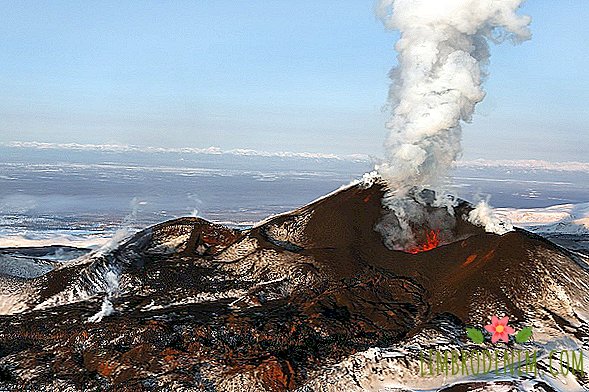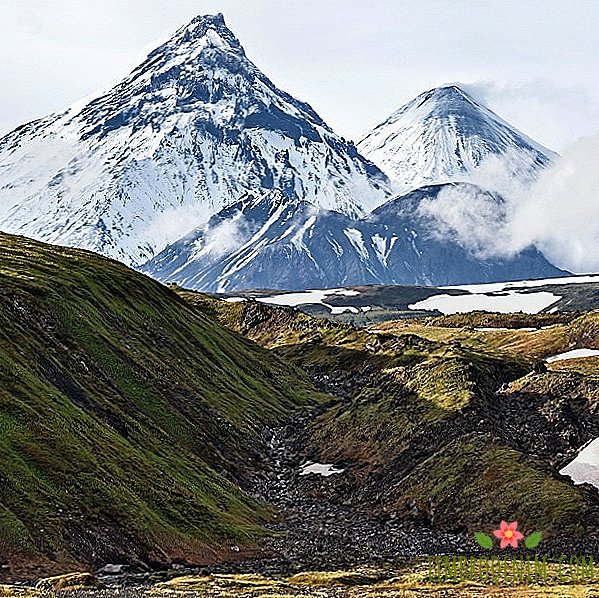How I paved hiking trails in Kamchatka
I once found it difficult to leave home for more than two weeks, I could not imagine how to travel without a voucher, a good hotel, a paunchy suitcase and a noisy company. Carefully made a vacation plan, where every day was painted by the minute, and began to pack a suitcase two weeks before the trip. Even if it was about a couple of days at the cottage with friends. Then everything changed, and the reasons were commonplace: the work was depressing, the relationship with the guy came to a standstill, and I felt an acute need for new sensations. So began my love for spontaneous trips, mountain hikes, confused plans and decisions that are not easy, but which you never regret. The last such decision was participation in a three-month volunteer project in faraway Kamchatka.

For the past few years, I have spent holidays in the mountains: first, these were easy walks, then categorical hikes, and last year - alpsbags in the Caucasus. There were no goals to become a mountaineer, I just liked to wander through the mountains with a backpack over my shoulders, climbing higher and higher and discovering places of amazing beauty. Clouds underfoot, it seems that meteors fall somewhere below you, and at night - silence and the sky, so stellar that you can not sleep.
In April of this year, I was sure that in the summer I would climb Elbrus with my husband when I caught a glimpse of information on volunteering in Kamchatka on a friend’s Facebook page. I read it for fun. Bystrinsky Nature Park invited tourists under the age of thirty-five years to spend three months in Kamchatka with full board. The park paid for air tickets (and this is the most expensive for those who travel to the peninsula), meals, transfer to the place of work and back, provided public equipment for the trip. Volunteers were required to lay trails for future tourists, open new routes and repair infrastructure facilities. The ad was highlighted in bold: "Boys are welcome."
Then I didn’t really imagine what would be required of me, but I liked the prospect of looking at the work of the natural park from the inside, and even in Kamchatka. It was something completely new, fantastic - something that was worth trying at least out of curiosity. I sent a biography and motivation letter to the address indicated; Pro age decided to lie a little, writing that I was thirty. Anyway, there was little chance: I didn’t have a little hiking experience, I wasn’t seriously involved in mountaineering, so I tried to write my other advantages in my letter, for example, that I teach yoga and can help members of the group relieve stress after a heavy load. I also speak several foreign languages and have been living in my own house for a couple of years, so I am familiar with construction and renovation firsthand.
Clouds underfoot, it seems that meteors fall somewhere below you, and at night - silence and the sky, so stellar that you can not sleep
A few days after sending the letter, I studied materials about volunteer work and in my thirty-one year I learned that this is an incredibly interesting way to travel around the world. Projects are different: not everywhere so lucky, as in Bystrinsky park, somewhere you have to spend money on tickets, accommodation or meals. But such impressions do not get a savage in a "package" tour, or on a trip savage. One of my new Kamchatka acquaintances has been a volunteer for the first year and has already been on a horse farm in Greece and in a tiger reserve with a Thai monastery, where she cared for tiger cubs and fed huge predators on her own.
In Russia, volunteers mainly take men. On the Commander Islands, for example, women are most often sought after as cooks, the same on Sakhalin, not to mention the High North. It is much easier to find an interesting project for girls with education in the field of biology, zoology, ecology and in related scientific fields - for them there are grants and special scientific programs. If you just want to travel, look at the country and help the reserves as much as possible, without closing in the kitchen, you will have to look. I immediately liked the Kamchatka project because I didn’t say a word about cooking skills, but promised to work "in the fields." Yes, he demanded special skills, but as it turned out, I, with my three hikes and life experience in the countryside, turned out to be more interesting for the park alpinists-dischargers.
I did not answer for a long time, but then everything began to turn out. They wrote that mine was chosen from more than 400 questionnaires and, if I agree to spend three months in Kamchatka, I need to send the data for buying a ticket. If not, my candidacy is easily replaced. I sat in front of the monitor for about forty minutes. In my head all mixed up. When it was just a dream, I didn’t think how I would leave the family for three months, what would happen to my job, to whom I would leave the house, private students, dogs, eventually. I was really scared before the need to quickly make a decision and take responsibility for its results. Volcanoes, the Pacific Ocean, whales, bears - does such a chance occur in life twice? Forty minutes later I wrote an answer, and a few hours later an e-ticket for the flight Moscow-Petropavlovsk-Kamchatsky came to my post office.
In Petropavlovsk at the end of June it was +14 and overcast. When the difference with Moscow at nine o'clock is quite difficult to acclimatize. I got on the bus and along the only dirt road on the peninsula that connected the villages, I got to clean, asphalted and well-groomed Esso, the administrative center of the Bystrinsky district, in ten hours. Me and three more lucky ones selected this year were settled in a big house, where, since 2007, when the project started, volunteers from Russia, Belarus, Latvia, Germany, France live. The house was full of people: it turned out that only the four of us came for three months, and the rest live here for a year and a half, they study reindeer breeding, entomology, biodiversity of the region, help Bystrinsky park to collect scientific data and manage with a huge flow of tourists coming to Kamchatka . Most of them work in the park office, occasionally leaving Esso as tourist guides and laborers, for example, to paint gazebos on the route, repair tourist campsites, install signposts.
Life here is unhurried. The promised throwing at the Ketachan cordon had to wait two weeks, during which we went to either mow the grass, or repair the fence, and once went on a reconnaissance of the tourist trail to the Lake Saucer. This first joint hike was interesting and difficult, but we didn’t build a trail, because we had to climb over the cedar elfin woods, go down a steep cliff, cross the stormy rivers at random, and then experience the unpleasant nightly encounter with the brown bear. Not everyone coped with this campaign: one of the guys, the mine rescuer with experience, became ill, so we dragged his belongings, and the guys led him by the arms. The project coordinator sent him home and said that this is not the first time. We went to the cordon "Ketachan" - the place of our main work - four of us: two girls, a fellow zoologist from new volunteers and a team leader from those who have been volunteers for a long time.
The cordon can be reached on the way to the gold mines from the village Milkovo. It is 120 kilometers of narrow, bumpy dirt road with access control. Of course, there is no mobile communication; Once a day we sent a message with coordinates on a satellite tracker - and that's it. Every day I wrote letters to my husband in a notebook, kept a diary and tried not to lose my mind, being alone with people with whom I even had nothing to talk about.
For two months we lived in tents, washed clothes in rivers, bathed in lakes and cooked monotonous food on a fire if there was a forest around, or on a gas burner if we were surrounded by tundra. We went in the rain, heat, fog, climbed over the ancient lava flows, crossed many kilometers of swamps, overgrown with floodplains of rivers. Often I had to walk all day in rubber boots, after which my feet ached; we spent the night anywhere, freezing, then choking on the heat, we climbed the slopes of volcanoes, nearly collapsed on a melting glacier and every day we met bears, we had to shout, scare, make noise, build fearless forest dwellers so that the beast would leave. I had to clench my teeth and carry a backpack, which I wouldn’t raise in everyday life, and most importantly - I had to become truly fearless, because there are no people and crowds of bears around for hundreds of kilometers. The task of the group is not just to get out alive and healthy, but to understand whether tourists can walk here in the future.
I had to become truly fearless, because there were not a single person and a crowd of bears around for hundreds of kilometers
Previously, I did not think about the fact that before somewhere a trodden tourist path appears, along which hundreds and thousands of people will go, breathing heavily and considering the route difficult, someone has to develop this path. We were not the first people here, but we were the first to record the track (the history of our movement), we were looking for a convenient way, got into any place that could be potentially interesting, thought out additional routes and places for parking. Sometimes it was scary, hard, overwhelmed, but with each new step I saw miracles that cost any effort: frozen lava flows, gigantic volcanoes, endless mountain tundra, blueberry fields, flocks of bighorn sheep, families of bears, shoals of salmon, going to spawn. In the middle of summer, our diet was replenished with various berries, mushrooms the size of a soccer ball and fish, which sometimes could be caught by hand. It was some kind of boundless happiness, and I wanted to share it with the whole world.
Still, in this barrel of honey had its own spoon of tar: here, on the edge of the earth, in our tiny society of four, some began to re-build the hierarchy. In the city, you communicate only with those who interest you, and on the project we lived, ate, slept for four months, having nothing in common. At first I wanted to get used to each other, to understand and love people with whom you walk along a dangerous path, but ambitions - and this was especially true of guys - terribly interfered with the process, turning communication into a struggle for the right to have your own opinion. There was no friendly team out of us, although we still showed excellent results following the results of the project. As soon as the group was taken from the Ketachan cordon back to Esso, we immediately sprawled in the corners and tried not to meet again until the very departure.
In July, the most active volcano of the peninsula - Klyuchevskaya Sopka - threw a column of ash into the sky, and a long, quiet eruption began. One boring September evening they called me from the office of Bystrinsky Park and offered to go to Tolbachik, one of the volcanoes of the Klyuchevskaya group. With a few volunteer girls, we quickly got together, the former director of the park gave us a personal car to Kozyrevsk, where we got on a tourist rotational bus and five hours later we seemed to be on another planet. Here at one time the lunar rover was tested, since the surface of the earth almost completely coincides with the moon. Flat Tolbachik last erupted only three years ago, and whimsically stiffened lava in some places still feels hot, and at night you can see bright red spots like portals on its black surface and light a specially brought stick in them with children's delight. We climbed to the summit of the crater of a recently erupting live volcano and very close saw the smoking and breathing Klyuchevskaya. It is difficult to convey feelings when you are standing there. It is as if you are stunned, your lips are spreading out in a smile by themselves, and you are standing as if spellbound, trying to capture these kinds of things in your memory forever.
After the alien Tolbachik, when a week remained before the flight home, I drove off to Ust-Kamchatsk. With a girl-zoologist from Belarus, who hitchhiked half the world, and her acquaintance from Ust-Kamchatsk, we went along the coast with black volcanic sand to Cape Kamchatsky, where the Pacific Ocean and the Bering Sea are connected. There we spent three days in a hunting hut, fed on seaweed and fresh mussels, walked on the reef between the tides, watched the sunsets and the sealfish swimming very close by, took pictures of the whales that were picked around by the bears and just enjoyed the sounds of the ocean surf or the occasional silence. There, I suddenly remembered what an artist in Esso told me: "If you fall in love with Kamchatka, she will never let go again." In the Kamchatka Cape, I finally understood - I fell in love.
At first it seemed to me that three months was a terribly long time, but when I arrived in Petropavlovsk at the end of September, I realized that I did not want to leave. There are new friends in Kamchatka, thousands of paths that have not been traversed, unfinished thoughts, and miles of notes that now I want to turn into a book. For all the time in Kamchatka, I spent seven thousand rubles, and then only for souvenirs and self-indulgence like ice cream and pies, which you dream of on a campaign.
Previously, I did not think that I could endure such an adventure and miss it so much, but this is perhaps the best thing that happened in my life. It's not just the beauty and complexity of the path. The fact is that in extreme conditions you begin to see yourself in a new way. Therefore, when I returned to Moscow, I gave up my previous work and decided to open my yoga studio, and I also returned to the dream that I was buried working in the theater. I am an opera singer by my second education, I did not work long after the conservatory in Siberia for a long time, but at home, in Moscow, I could not get a job because of the crazy competition. In Kamchatka, I finally realized that I wanted to continue singing and, most importantly, I now have enough strength for any tests, and turning mountains on the way to a dream is a trifle. You just have to decide once, clench your teeth and step into the unknown.
Photo: kamchatka - stock.adobe.com (1, 2)





